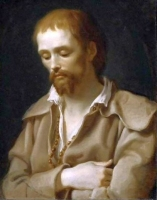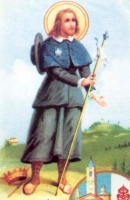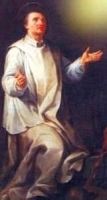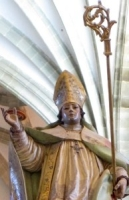St. Turibius the Monk
Feastday: April 16/11 November
Death: 528
Abbot and founder of the Spanish abbey of Liebana in Asturias. Turibius was probably consecrated as bishop. The abbey became a Benedictine stronghold in time.
Saint Turibius of Liébana (fl. c. 530), also known as Turbius the Monk (Turibius Monachus, Toribio el Monje), was an early Benedictine monk. He was born probably in Turieno and spent most of his life in the region of Liébana. He received a letter full of praise from Bishop Montanus of Toledo in 527.[1] In his preaching he condemned as heresy the Priscillianism still rampant in Spain.[1] Around the middle of the century he and five companions took up the Benedictine habit and founded the monastery of Liébana, either the second or third oldest Benedictine establishment in Spain, dedicating it to Martin of Tours.
Turibius of Liébana has been conflated with Turibius of Astorga (died 460), also a saint, whose bones came to rest in the monastery the former Turibius had founded and where he also was buried.[1]
According to the Chronicon attributed to Hauberto, a Benedictine Mozarab of the reign of Alfonso III of Asturias, but actually a forgery by Antonio Lupian Zapata,[2] Turibius became Bishop of Palencia in 533. He was also said to have translated the body of Antoninus of Pamiers to the Cathedral of Palencia, thereafter named in his honour.[3]
His feast day is 11 November, or 16 April in other calendars.
St. Paternus
Feastday: April 16
Birth: 481
Death: 564
Also called Pair, the bishop of Avranches. A native of Poitiers, France, he entered the monastery of Ansion at Poitou and then became a hermit, with St. Scubilio, at Scissy, near Granville, Normandy. The other hermits whom they attracted became eventually became so numerous that Paternus organized them into a community, St. Pair, over which he functioned as abbot. Later, at about the age of seventy, he was named bishop of Avranches, Normandy. He is often confused in legends with St. Paternus of Wales.
Padarn (Latin: Paternus, Padarnus; Welsh: Padarn; Breton: Padern; ? – c. 550 AD)[1] was an early 6th century British Christian abbot-bishop who founded St Padarn's Church in[2] Ceredigion, Wales. He appears to be one and the same with the first bishop of Braga and Saint Paternus of Avranches in Normandy. Padarn built a monastery in Vannes and is considered one of the seven founding saints of Brittany. Padarn's early vita is one of five insular and two Breton saints' lives that mention King Arthur independently of Geoffrey of Monmouth's Historia Regum Britanniae
Saint Bernadette of Lourdes
புனிதர் பெர்னதெத் சௌபிரஸ்
அருட்கன்னியர்/ மரியாள் திருக்காட்சியாளர்:
பிறப்பு: ஜனவரி 7, 1844
லூர்து, ஃபிரான்ஸ்
இறப்பு: ஏப்ரல் 16, 1879 (வயது 35)
நிவேர்ஸ், ஃபிரான்ஸ்
ஏற்கும் சமயம்:
ரோமன் கத்தோலிக்க திருச்சபை
முக்திபேறு பட்டம்: ஜூன் 14, 1925
திருத்தந்தை 11ம் பயஸ்
புனிதர் பட்டம்: டிசம்பர் 8, 1933
திருத்தந்தை 11ம் பயஸ்
நினைவுத் திருவிழா: ஏப்ரல் 16
பாதுகாவல்:
உடல் நோய்வாய்ப்படுதல், லூர்து நகர் (Lourdes), ஃபிரான்ஸ், மேய்ப்பர்கள், வறுமைக்கு எதிராக, தங்கள் விசுவாசத்திற்காக ஏளனம் செய்யப்பட்ட மக்கள்
புனிதர் பெர்னதெத் சௌபிரஸ், ஃபிரான்ஸ் நாட்டின் லூர்து நகரில் 1844ம் ஆண்டு, ஜனவரி மாதம், 7ம் தேதி பிறந்தார். சிறு வயதில் இருந்தே இயேசு கிறிஸ்துவின் மீதும், அன்னை மரியாளின் மேலும் பக்தியுள்ள கிறிஸ்தவராக வளர்ந்தார். இவருடைய தந்தை ஒரு ஆலையில் வேலை செய்து வந்தார். பெர்னதெத் தனது நேரத்தை பெற்றோருக்கு பயனுள்ள விதத்தில் செலவழித்தார்.
மரியாளின் காட்சிகள் :
பெர்னதெத்துக்கு 14 வயது நடந்தபோது, ஒருநாள் தனது சகோதரி மற்றும் தோழியுடன் விறகு பொறுக்க சென்றார். அவர்கள் “மஸ்சபியேல்” (Massabielle) என்ற குகை அருகே சென்று கொண்டிருந்த வேளையில், மரியன்னை ஒரு இளம் பெண்ணாக இவருக்கு காட்சி அளித்தார்.
பெர்னதெத் தன்னுடன் வந்த இருவரிடமும், “அதோ பாருங்கள் மிகவும் அழகான ஓர் இளம் பெண்” என்று கூறினார். இவரது சகோதரிக்கும் தோழிக்கும் எதுவும் தெரியவில்லை. ஆனால் மரியன்னை, பெர்னதத்தை மீண்டும் அதே இடத்திற்கு வரச் சொன்னார். 1858ம் ஆண்டு, ஃபெப்ரவரி மாதம், 11ம் தேதி முதல் ஜூலை 16ம் தேதி வரை 18 முறை இவர் மரியன்னையின் காட்சிகளைக் காணும் பேறுபெற்றார். இவர் பின்னே ஒரு கூட்டம் பக்தியுடனும், மற்றொரு கூட்டம் கேலியுடனும் பின் தொடர்ந்தன.
அந்த இடத்தில் தனது பெயரால் ஓர் ஆலயம் எழுப்பப்பட வேண்டுமென்று மரியன்னை பெர்னதெத்திடம் கூறினார். அன்னையின் வேண்டுகோளை பங்குத் தந்தையிடம் பெர்னதெத் சொன்னபோது, அவர் அந்த காட்சியை நம்ப மறுத்தார். காட்சி அளித்த பெண்ணின் பெயரை கேட்டு வருமாறு சொல்லி அனுப்பினார். மரியாள் இவரிடம், “நானே அமல உற்பவம்” (Immaculate Conception) என்று தன்னைப் பற்றிக் கூறினார். இதற்கு பாவமின்றி பிறந்தவர் என்பது பொருள்.
அதைத் தொடர்ந்து திருச்சபை அதிகாரிகள் காட்சியின் உண்மைத் தன்மையை ஆய்வு செய்தனர். பெர்னதத் 16வது காட்சியைக் கண்டபோது, இவர் கையில் இருந்த மெழுகுவர்த்தி தலைகீழாக எரிந்தது. சிலர் 15 நிமிட அளவாக, இவரது கையை தீயினால் சுட்டனர். அது இவரை ஒன்றுமே செய்யவில்லை. ஒரு காட்சியின்போது, மரியாளின் கட்டளையை ஏற்று பெர்னதத் தோண்டிய ஊற்று நீர், இக்காலத்தில் அதைப் பருகுபவர்களின் நோயைத் தீர்க்கும் மருந்தாக செயல்படுகிறது.
கத்தோலிக்க திருச்சபை இந்த காட்சிகளை முதலில் ஏற்க தயங்கினாலும், இவற்றை ஆய்வு செய்த நிபுணர் குழு இக்காட்சிகள் நம்பத் தகுந்தவை என சான்றளித்தது. இக்காட்சிகளில் காணப்பட்டவர் இயேசுவின் தாய் மரியாள் என்பதை ஏற்று, அவரை லூர்து அன்னை என்று கத்தோலிக்க திருச்சபை அழைக்கிறது.
அருட்சகோதரியாக:
பெர்னதெத் தனது 22ம் வயதில், நெவர்ஸ் நகரில் இருந்த கருணையின் சகோதரிகள் (Sisters of Charity of Nevers) மடத்தில் துறவற வாழ்வைத் தொடங்கினார். அந்த மடத்தில்தான் இவர் எழுதவும் படிக்கவும் கற்றுக்கொண்டார். இயேசுவிடமும் மரியன்னையிடமும் மிகுந்த பக்தி கொண்டவராய் வாழ்ந்தார்.
மேலும் அங்கே தையற் கலைஞராகவும், ஆலய பராமரிப்பாளராகவும் பெர்னதெத் சிறப்பாக பணி செய்தார். ஆலயத்தில் பயன்படுத்தப்படும் துணிகளில் இவர் பலவித கைவேலைப்பாடுகள் செய்து அழகுபடுத்தியுள்ளார்.
நோயும் மரணமும்:
இவருக்கு வலது கால் முட்டியின் எலும்பில் காச நோய் வந்தது. நீண்ட நாட்கள் ஆஸ்துமா நோயால் அவதிப்பட்டு வந்த பெர்னதெத், 1879ம் ஆண்டு, ஏப்ரல் மாதம், 16ம் தேதி தனது 35ம் வயதில் இறந்தார்.
புனிதர் பட்டம்:
1927ம் ஆண்டு, ஜூன் மாதம், 14ம் நாளன்று, திருத்தந்தை பதினேராம் பயஸ் இவருக்கு முக்திபேறு பட்டம் வழங்கினார்.
1933ம் ஆண்டு, டிசம்பர் மாதம், 8ம் நாளன்று, அமல உற்பவ அன்னை திருவிழா அன்று திருத்தந்தை 11ம் பயஸ் இவருக்கு புனிதர் பட்டம் வழங்கினார்.
புனிதர் பெர்னதத் சௌபிரசின் அழியாத உடல், இவர் வாழ்ந்த நெவர்ஸ் நகர மடத்தின் சிற்றாலயத்தில் இன்றளவும் பாதுகாக்கப்பட்டு வருகிறது.
Also known as
• Bernardette Soubirous
• Sleeping Saint of Nevers
• Bernada, Bernardetta, Bernardette, Maria Bernadette, Marie Bernarde
Additional Memorial
18 February in France
Profile
Oldest of six children born to François and Louise Casterot, and grew up very poor. Hired out as a servant from age 12 to 14. Shepherdess. On 11 February 1858, around the time of her first Communion, she received a vision of the Virgin; her own account of it is in the Readings section below. She received seventeen more in the next five months, and was led to a spring of healing waters. She moved into a house with the Sisters of Nevers at Lourdes where she lived, worked, and learned to read and write. The sisters cared for the sick and indigent, and at age 22 they admitted Bernadette into their order since she was both. Always sick herself, and often mistreated by her superiors, she died with a prayer for Mary's aid. Since the appearances of Mary to young Bernadette in 1858, more than 200 million people have visited the shrine of Lourdes.
Born
7 January 1844 at Lourdes, Hautes-Pyrénées, France
Died
• 16 April 1879, Nevers, Nièvre, France of natural causes
• body incorrupt
• the sisters covered the body in wax, and it is on display in Nevers
Canonized
8 December 1933 by Pope Pius XI
Saint Fructuosus of Braga
Profile
Son of a Gothic general, and member of a noble military family. Studied at the seminary in Palencia. From an early age, Fructuosus felt a call to the religious life. Orphaned when young. When he came of age, Fructuosus gave away his family fortune to the poor, bought the freedom of slaves, and founded several monasteries. By 647 he had founded houses in Lusitania, Asturia, Spanish Galicia, and the island of Gades.
Feeling that he lacked contact with God, Fructuosus left the houses and friends, and became a hermit in the desert of Galacia. His reputation for holiness and wisdom attracted students, sometimes entire families. He built monasteries for them, placed them under the Benedictine Rule, and served as abbot. He attracted so many disciples that the king limited the number of men who could join; he feared there would not be enough young men to man the army.
Again feeling that the outside world was taking too much of this time, Fructuosus planned to flee further into the wilderness, this time to the deserts in Egypt. However, the king got word of the plan, decided too many people depended on his leadership, and ordered him not to leave the country. Bishop of Dumium in 654. Archbishop of Braga, Portugal in 656. Wrote two monastic rules, one of which was designed to allow families to remain together, yet live monastic lives.
Born
early 7th century Spain
Died
• 16 April 665
• his deathbed was a pile of ashes he had placed before the altar
• relics translated to Santiago de Compostela, Spain in 1102
• his tomb became a place for pilgrimages, and a scene of miracles
Saint Drogo
Also known as
Dreux, Drugo, Druon
Profile
Born to the Flemish nobility. His mother died giving him birth, a fact that emotionally crushed him when he learned of it at age 10; he imagined himself responsible for her death. Later in life he practiced extreme penances, possibly to expiate this guilt. Orphaned in his teens. At 18, he disposed of all his property and became a penitential pilgrim, making nine trips to Rome, Italy. Shepherd for six years at Sebourg, near Valencienne, France, working for Elizabeth de la Haire. Revered for his holiness. Reportedly able to bilocate, with witnesses seeing him simultaneously working the fields and attending Mass. Stricken with an unsightly bodily affliction during a pilgrimage, he became a hermit at Sebourg in Hainault for 40 years surviving on barley, water, and the Eucharist.
Born
1105
Died
c.1186 at Seboug, France
Saint Benedict Joseph Labre
புனிதர் பெனடிக்ட் ஜோசஃப் லேபர்
நித்திய ஆராதனையின் யாசகர்:
பிறப்பு: மார்ச் 25, 1748
அமெட்டஸ், அர்ட்டாய்ஸ், ஃபிரான்ஸ் அரசு
இறப்பு: ஏப்ரல் 16, 1783 (வயது 35)
ரோம், திருத்தந்தையர் மாநிலங்கள்
ஏற்கும் சபை:
கத்தோலிக்க திருச்சபை – (புனிதர் ஃபிரான்சிசின் மூன்றாம் நிலை சபை)
முக்திபேறு பட்டம்: மே 20, 1860
திருத்தந்தை ஒன்பதாம் பயஸ்
புனிதர் பட்டம்: டிசம்பர் 8, 1881
திருத்தந்தை பதின்மூன்றாம் லியோ
முக்கிய திருத்தலம்:
சாண்டா மரியா அய் மொண்டி, ரோம், இத்தாலி
நினைவுத் திருநாள்: ஏப்ரல் 16
பாதுகாவல்:
திருமணமாகாத ஆண்கள், நிராகரித்தல், மன நோய், மனநலம் பாதிக்கப்பட்ட மக்கள், பிச்சைக்காரர்கள், வீடற்றவர்கள், நாடோடிகள் (Hobos)
புனிதர் பெனடிக்ட் ஜோசஃப் லேபர், ஃபிரெஞ்ச் நித்திய ஆராதனையின் யாசகரும், ஃ பிரான்சிஸ்கன் மூன்றாம் நிலை துறவியும், கத்தோலிக்க புனிதருமாவார்.
வட ஃபிரான்ஸ் (North of France) நாட்டின் “அர்டாய்ஸ்” (Artois) மாகாணத்திலுள்ள “பஸ்-டி-கலாய்ஸ் டிபார்ட்மென்ட்” (Pas-de-Calais department) தலைநகரான “அர்ராஸ்” (Arras) நகரின் அருகேயுள்ள “அமெட்டஸ்” (Amettes) கிராமத்தில், 1748ம் ஆண்டு பிறந்த இவர், தமது பெற்றோரின் பதினைந்து குழந்தைகளுள் மூத்த குழந்தை ஆவார். இவரது தந்தையார், ஒரு வசதியான வியாபாரியாவார். அவரது பெயர், “ஜீன் பேப்டிஸ்ட் லேபர்” (Jean Baptist Labre) ஆகும். இவரது தாயாரின் பெயர், “அன்னி கிரேன்ட்ஷைர்” (Anne Grandsire) ஆகும்.
இவரது கிராமத்திலிருந்து சிறிது தூரத்தில் சேவையாற்றிய கத்தோலிக்க குருவான இவாது தாய்மாமன், மகிழ்ச்சியுடன் இவரை ஏற்று, இவருக்கு குருத்துவ கல்வியில் வழி காட்டினார். இவர், தமது பதினாறு வயதில், பெனடிக்ட் சட்டங்களின்படி (Rule of St. Benedict) நடத்தப்படும் “சிஸ்டேர்சியன்” (Cistercian order) சபையின் கிளையான “ட்ரேப்பிஸ்ட்” (Trappist) துறவியாக உதவுமாறு தமது தாய்மாமனான குருவை வேண்டினார். ஆனால் அவரது பெற்றோரோ, அவரை இன்னமும் வயதாகும்வரை காத்திருக்கச் சொன்னார்கள்.
பெனடிக்டுக்கு பதினெட்டு வயதாகையில், கொள்ளை தொற்று நோயால் இவர்களது கிராமம் பாதிக்கப்பட்டபோது, மாமனும் மருமகனும் இணைந்து நோயால் பாதிக்கப்பட்ட மக்களுக்கு சேவை செய்வதில் தீவிரமானார்கள். மாமன் பாதிக்கப்பட்ட மக்களின் ஆன்மாக்களையும் உடல்களையும் கவனித்துக் கொண்டிருந்தபோது, பெனடிக்ட் கால்நடைகள் கவனித்துக் கொண்டிருந்தார். இவர், அவைகளின் கொட்டில்களை சுத்திகரித்து அவற்றுக்கு உணவளித்தார். தமது மாமனின் கீழே, ஒரு மாணவனான இவர், ஒரு விவசாய கூலித் தொழிலாளியாக மாறினார். தொற்றுநோயால் பாதிக்கப்பட்டவர்களுள் இறுதியானவராக இவரது மாமன் இருந்தார்.
பெனடிக்ட், (La Trappe Abbey) எனும் துறவு மடத்தில் இணைவதற்காக விண்ணப்பித்தார். ஆனால், இவரது குறைவான வயது காரணத்தாலும், தனிப்பட்ட முறையில் இவருக்கு யாரும் பரிந்துரைக்காத காரணத்தாலும், இவர் நிராகரிக்கப்பட்டார். பின்னர் இவர், “கார்தூசியன்” (Carthusians) மற்றும் “சிஸ்டேர்சியன்” (Cistercians) சபைகளில் இணைவதற்கும் முயற்சித்தார். ஆனால், இவர் ஆன்மீக வாழ்க்கைக்கு பொருத்தமற்றவர் என்ற காரணம் காட்டி, இரண்டு சபைகளுமே இவரை நிராகரித்தன. இவர், சுமார் ஆறு வாரங்களாக, “நுவில்லியில்” (Neuville) உள்ள கார்தூசியர்களில் ஒருவராக இருந்தார். 1769ம் ஆண்டு, நவம்பர் மாதம், அவர் “செப்ட்-ஃபாண்ட்ஸ்” (Sept-Fonts) எனுமிடத்திலுள்ள சிஸ்டெசியியன் மடத்தில் (Cistercian Abbey) அனுமதி பெற்றார். ஆனால், சிறிது காலத்திலேயே அவரது உடல் ஆரோக்கியம் காரணமாக, அவர் வேறு இடங்களில் பணியாற்ற முடிவு செய்யப்பட்டது.
கத்தோலிக்க பாரம்பரியப்படி, கடவுளால் தமக்கு அளிக்கப்பட்டது என்று இவர் நினைத்த தமது விருப்பங்களை தாம் அனுபவிப்பதாக எண்ணினார். புனிதர் அலெக்சியஸ் (Saint Alexius of Rome) அவர்களை உதாரணமாகக் கொண்டு ஈர்க்கப்பட்டார். தூய ஃபிரான்சிஸ்கன் துறவி “புனிதர் ரோச்” (Saint Roch) அவர்களின் திருயாத்திரைகளை உதாரணமாக ஏற்றார். தனது நாட்டையும் பெற்றோர்களையும் விட்டு விலக முடிவு செய்தார். மற்றும் உலகில் ஒரு புதிய வகையான வாழ்க்கை வாழ, மிகவும் வேதனைமிகுந்த, மிகுந்த தண்டனைக்குரிய வாழ்க்கையை விரும்பினார். உலகின் கிறிஸ்தவ பக்தியின் புகழ்பெற்ற இடங்களில் ஒரு யாத்திரிகனானார்.
புனித பிரான்சிஸின் மூன்றாம் நிலை (Third Order of Saint Francis) சபையில் இணைந்த பெனடிக்ட், எளிய வாழ்க்கையையும் புனிதர் யாத்திரைகளையும் விரும்பி ஏற்றார். முதலில் ரோம் நகருக்கு நடைபயணம் சென்றார். வழியில் யாசகம் பெற்று, அவற்றைக் கொண்டே உண்டார். பின்னர் அவர் ஐரோப்பாவின் பெரும்பாலான பிரதான திருத்தலங்களுக்கு அடிக்கடி சென்றார். அர்ஜென்டினா (Argentina) நாட்டின் “லொரெட்டோ” (Loreto) எனுமிடத்திலுள்ள பல்வேறு திருத்தலங்களுக்கு யாத்திரை சென்றார். இத்தாலி (Italy) நாட்டிலுள்ள அசிசி (Assisi), நேப்பில்ஸ் (Naples) மற்றும் “பாரி” (Bari) ஆகிய திருத்தலங்களுக்கும் யாத்திரை சென்றார். சுவிட்சர்லாந்து (Switzerland) நாட்டின் “ஈய்ன்சியேடேல்ன்” (Einsiedeln) திருத்தலத்திற்கு சென்றார். ஃபிரான்ஸ் (France) நாட்டிலுள்ள “பரே-லி-மோனியல்” (Paray-le-Monial) திருத்தலத்திற்கும் ஸ்பெயின் (Spain) நாட்டிலுள்ள “சேன்டியாகோ டி கம்போஸ்டேலா” (Santiago de Compostela) திருத்தலத்திற்கும் சென்றார். இந்த பயணங்களின்போது அவர் எப்போதும் நடைபயனமாகவே சென்றார். சேறு மற்றும் கந்தலான அவரது ஆடைகளுடன் திறந்த வெளியில் அல்லது கிடைத்த அறையின் மூளைகளிலேயே உறங்கினார். யாசித்து கிடைத்த சில உணவு வகைகளையே உண்டார். அதனையும் பிறருடன் பகிர்ந்துகொண்டார். அவர் அரிதாக பேசினார், அடிக்கடி ஜெபம் செய்தார், அவர் பெற்ற ஏச்சுபேச்சுகளையும் அமைதியாக ஏற்றுக்கொண்டார்.
இவ்வாறாக, பெனடிக்ட் ஒரு யாசகராகவே இறுதிவரை வாழ்ந்தார். குறிப்பாக, கடவுளின் முட்கிரீடத்தைப் பற்றி சிந்திக்கும்போது அடிக்கடி அவர் மயக்கமடைவார் என கூறப்படுகிறது. இவர், தாம் சந்தித்த பிற வீடற்ற மக்களை குணப்படுத்தியதாகவும், தமக்கு கிடைத்த ரொட்டித் துண்டுகளை பல்கிப் பெருக வைத்ததாகவும் கூறப்படுகிறது. அவரது வாழ்நாளின் கடைசி ஆண்டுகளில் (அவருடைய முப்பதுகளில்), அவர் ரோமில் வசித்து வந்தார். கொலோசெய்யின் (Colosseum) இடிபாடுகளில் வாழ்ந்த ஒரு காலப்பகுதிக்காக, லொரெட்டோவின் அன்னை (Shrine of Our Lady of Loreto) திருத்தலத்திற்கு ஒரு வருடாந்திர புனித யாத்ரீகத்தை மட்டுமே செய்ய முடிந்தது.
அவர் நகரத்தில் அனைவருக்கும் அறிமுகமான ஒரு நபராக இருந்தார். மற்றும் நற்கருணை ஆராதனைக்கான அவரது அர்ப்பணிப்புக்காக "நாற்பது மணி நேரத்தின் துறவி" (Saint of the Forty Hours) என அறியப்படுகிறார்.
அவர் இறப்பதற்கு ஒருநாள் முன், “சாண்டா மரியா ஆய் மோன்டி” தேவாலயத்தில் (Church of Santa Maria ai Monti) சரிந்து விழுந்தார். அவரது எதிர்ப்பையும் மீறி, அவர் ஆலயத்தின் பின்னால் இருந்த ஒரு வீட்டிற்கு தூக்கி செல்லப்பட்டார். 1783ம் ஆண்டு, ஏப்ரல் மாதம், 16ம் தேதியன்று, புனித வாரத்தின்போது (Holy Week) ஊட்டச்சத்துக் குறைவு காரணமாக அவர் மரித்தார். அவர், “சாண்டா மரியா ஆய் மோன்டி” (Church of Santa Maria ai Monti) தேவாலயத்தில் அடக்கம் செய்யப்பட்டார்.
இவரது சரித்திரத்தை எழுதிய இவரது ஒப்புரவாளரான “மார்கோனி” (Marconi), இவர் மறித்து மூன்றே மாத காலத்துக்குள், இவரது பரிந்துரை காரணமாக 136 பேர் நோயினின்றும் அற்புதமாக குணமானதாக எழுதியுள்ளார்.
Also known as
• Beggar of Perpetual Adoration
• Benedetto Giuseppe Labre
Profile
Oldest of fifteen children in a prosperous middle class family. Educated by his uncle, a parish priest. Following his uncle's death, he tried to join the Trappists, Carthusians, and Cistercians, but was rejected by them all. He spent years wandering Europe, especially Rome, Italy, in complete poverty, spending his days in perpetual adoration in the cathedrals. Given to religious ecstacies when contemplating the crown of thorns; reputed to float, soar, and bilocate when in these swoons. He begged in the streets, and if he was given more than he needed for the day, he would give the remainder to some one he considered more in need than he was. Benedict healed some of his fellow homeless, and was reported to have multiplied bread for them. Noted counselor to people of all walks in Rome. He died in a hospice, exhausted from his life of austerity. His biography, written by his confessor Marconi, describes 136 miraculous cures attributed to him within three months of his death.
Born
25 March 1748 at Amettes, Boulogne, France
Died
• 17 April 1783 at Rome, Italy
• interred at the Church of Santa Maria ai Monti, Rome
Canonized
8 December 1881 by Pope Leo XIII
Saint Magnus of Orkney
Also known as
• Magnus Erlendsson of Orkney
• Magnus Erlendsson
• Magnus the Martyr
• Mans...
Additional Memorial
13 December (translation of relics)
Profile
Born to a Viking family, son of Erlend Thorfinnsson, Earl of Orkney; related to King Olav II and King Harald II of Norway. He was raised as a pagan and lived as a pirate. Convert to Christianity, which made him unpopular in the Norwegian royal court especially when he refused to fight Christians. Earl of the Orkney Islands from 1108 to 1115. Killed during a political struggle with the pagan Norwegian elements for control of the Christian areas under his rule, and thus considered a martyr. Two sagas have been written about his life.
Born
c.1075 in the Orkney Islands, Scotland
Died
• struck in the head with an axe in 1115 at Egilsay Island, Scotland
• his last words were reported to a prayer asking for forgiveness of his killer
• buried in Christ Church, Birsay, Orkland, Scotland
• re-interred in cathedral of Saint Magnus in Kirkwall, Orkney, Scotland in 13 December 1137
• relics rediscovered during excavations in 1919
Blessed Joachim Piccolomini
Also known as
• Gioacchino Piccolomini
• Joachim of Siena
Additional Memorial
3 February (Servites)
Profile
Born to the Sienese nobility. A pious youth, noted for a devotion to the Blessed Virgin, and for giving all he had to the poor. Servite lay-brother at age 14. Spiritual student of Saint Philip Benizi. Urged by his brothers to study for the priesthood, Joachim felt he was not worthy, and aspired no higher than to be an altar server. He became so well known for his sanctity that he requested the Servites transfer him to Arezzo to escape devotees. The move caused such a stir of complaints in Siena that he was ordered to return.
Born
1258 at Siena, Italy
Died
16 April 1306 at Siena, Italy of natural causes
Beatified
• 21 March 1609 by Pope Paul V
• 9 January 1926 by Pope Pius XI (decree on heroic virtues)
Blessed Contardo d'Este
Also known as
Contardo the Pilgrim
Additional Memorial
last Saturday in August (translation of relics)
Profile
Eldest son in a family of Italian nobility, he gave up wealth and the world for piety and poverty, and died while on pilgrimage to Santiago de Compostella, Spain.
Born
1216 in Ferrara, Italy
Died
• 16 April 1249 in Broni, Pavia, diocese of Tortona, Italy of natural causes
• legend says that at his death all the local church bells began to ring, and flames were seen to flicker around his body to indicate his holiness
• buried in Broni
Beatified
• by Pope Paul V (cultus confirmation)
• by Pope Urban VIII (indulgences approved for devotions)
Blessed Mikel Suma
Also known as
Gaspër
Profile
Studied philosphy and theology in Shkodrë, Albania, the Austrian cities of Vienna, Grac and Lankowitz, and in Genoa, Italy. Ordained a priest in Genoa on 24 July 1921. Franciscan Friar Minor. Taught at the seminary in Shkodrë. Imprisoned for his faith by Communists authorities on 24 May 1948, he was given a show trial and sentenced to prison where he died. Martyr.
Born
23 March 1897 in Shkodrë, Albania
Died
16 April 1950 at the Great Prison in Shkodrë, Albania of cancer
Beatified
• 5 November 2016 by Pope Francis
• beatification celebrated at the Square of the Cathedral of Shën Shtjefnit, Shkodër, Albania, presided by Cardinal Angelo Amato
Blessed Arcangelo Canetoli
Profile
As a boy he survived the politically inspired massacred of the rest of his family. Entered the Canons Regular of Santa Maria di Reno. Priest. Lived at the Saint Ambrose convent at Gubbio, Italy in 1498. His reputation for holiness attracted the humble and powerful. Repeatedly refused the archbishopric of the city.
Born
1460 in Bologna, Italy
Died
• 16 April 1513 in Gubbio, Italy of an intense fever
• interred at the Saint Ambrose convent, Gubbio on 3 December 1513
• body incorrupt
Beatified
2 October 1748 by Pope Benedict XIV
Saint Turibius of Astorga
Also known as
Toribi, Toribio, Turrybiusz
Profile
Bishop of Astorga in northwest Spain. Known as a stern disciplinarian. Fierce opponent of Priscillianist heresy. Great supporter of Pope Saint Leo the Great.
Born
c.402 in Betanzos, Visigothic kingdom of Toledo (in modern Spain
Died
• c.460 in Tui, Spain of natural causes
• buried at the monastery of Santo Toribio de Liébana, Cantabria, Spain
Saint Lambert of Saragossa
Also known as
Lamberto, Lambertus
Additional Memorial
16 April as one of the Martyrs of Zaragoza
Profile
Farmer and servant during the period of Muslim occupation of Spain. Martyred by his Saracen master.
Died
• beheaded c.900
• jawbone enshrined in Maastricht, Netherlands
• monastery named for his was built on the trditional site of his execution in 1522; it was destroyed in 1808
Saint Lambert of Saragossa
Profile
Having survived the official persecutions of Diocletian, Lambert was murdered by local pagans who refused to accept any toleration of Christianity. Martyr.
Died
306 near Saragossa, Spain
Saint Herveus of Tours
Also known as
Herve
Profile
Monk and treasurer of the Saint Martin of Tours Abbey where, though he was one of the brothers, he lived as a hermit.
Born
at Touraine, France
Died
1021
Saint William Gnoffi
Also known as
Guglielmo Gnoffi
Profile
Atoned for a sinful youth by living as an extremely austere and penetential hermit.
Born
at Polizzi, Italy
Died
c.1317 of natural causes
Saint Vaise
Also known as
Vasius, Vaize
Profile
Wealthy citizen of Saintes, France who was imprisoned and murdered by his relatives for giving his property to the poor. Martyr.
Died
c.500
Saint Elias
Profile
Monk. Abbot of the Saint Martin the Great Abbey in Ireland in 1020. Abbot of Saint Panteleon Abbey in Cologne, Germany.
Born
Ireland
Died
1042
Martyrs of Avrillé
Additional Memorial
2 January as one of the Martyrs of Anjou
Profile
A group of lay people who were executed together for their faith during the anti-Christian persecutions of the French Revolution.
• Anne Maugrain
• François Micheneau veuve Gillot
• François Suhard veuve Ménard
• Jean Ménard
• Jeanne Gourdon veuve Moreau
• Jeanne Leduc épouse Paquier
• Jeanne Onillon veuve Onillon
• Jeanne Thomas veuve Delaunay
• Madeleine Cady épouse Desvignes
• Madeleine Sallé épouse Havard
• Marguerite Robin
• Marie Forestier
• Marie Gingueneau veuve Coiffard
• Marie Lardeux
• Marie Piou épouse Supiot
• Marie Rechard
• Marie Roger veuve Chartier
• Marie-Genevieve Poulain de la Forestrie
• Marthe Poulain de la Forestrie
• Perrine Bourigault
• Perrine Laurent
• Perrine Pottier épouse Turpault
• Pierre Delépine
• Renée Bourgeais veuve Juret
• Renée Rigault épouse Papin
• Renée Sechet veuve Davy
Died
16 April 1794 at Avrillé, Maine-et-Loire, France
Beatified
19 February 1984 by Pope John Paul II at Rome, Italy
Martyrs of Corinth
Profile
A group of eight Christians who were tortured and martyred together in the persecutions of Decius. We know little more than their names - Basilisa, Callistus, Charisius, Leonide, Galina, Nica, Nunencia and Teodora.
Died
thrown into the sea at Corinth, Greece c.250
Martyrs of Saragossa
Article
Group of eighteen martyrs murdered in 304 in Saragossa, Spain in the persecutions of Diocletian and the prefect Dacean. We know little more than the names - Apodemus, Caecilian, Caius, Crementius, Engratia, Eventius, Felix, Fronto, Gaius, Julia, Lambert, Lupercus, Martial, Optatus, Primitivus, Publius, Quintilian, Saturnius (4 men of this name), Succesus and Urban.
Died
graves re-discovered in 1389 in the crypt under the church of San Encrazia in Saragossa
Tetgaill of Lann-Ela
Saint Tetgaill of Lann-Ela was a 6th or 7th-century abbot commemorated on April 16th [1]. He resided over the monastery of Lann-Ela, which was originally founded by Saint Colman roughly a century before [1].
While there isn't much information readily available beyond that, here's what I can tell you:
Time Period: 6th/7th century AD
Role: Abbot of Lann-Ela monastery
Commemoration: April 16














